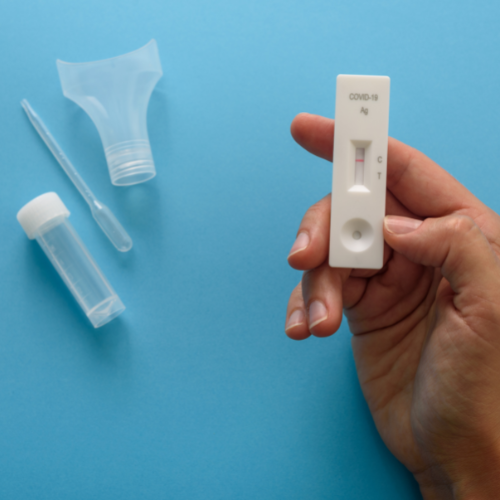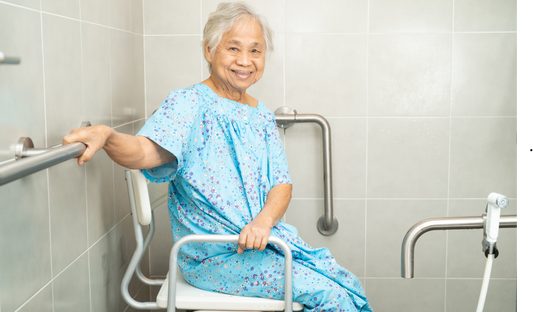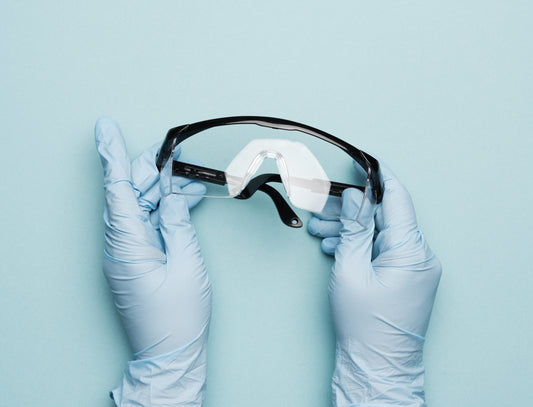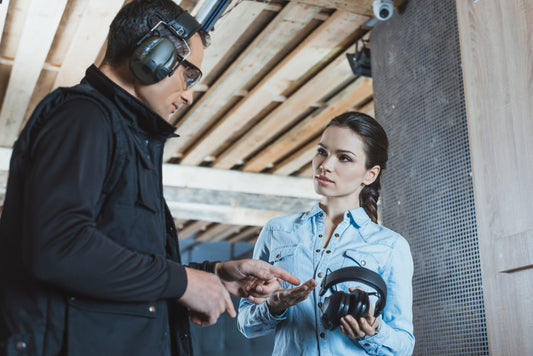
Covid-19 Testing: Everything You Need to Know

In 2020, when SARS-CoV-2 (COVID-19) started rapidly spreading we knew very little about the new virus and how to detect it. Thankfully, today things are a little different. Nearly three years of scientific inquiry have led us to a much better place. We now have the ability to test for COVID-19 through various means.
Still, there’s a lot of confusion around testing, what kind of tests are given, which tests are more accurate, when to test, what a positive test result means, and where to acquire a test. Whether you require a travel test, have been asked to test for work, or, would just like to know for personal reasons, here’s what you need to know.
In this post, we’re going to break down COVID-19 testing from test types to costs. This information can help you make an informed decision about when and how to test, should you wish to do so.
What are the different types of COVID-19 Tests and Which Should I Use?
There are currently several COVID-19 tests available. Each has pros and cons. Depending on your situation one type of test may be desirable over another.
-
Nucleic Acid Amplification Tests
Nucleic Acid Amplification Tests or NAATs, such as the well-known Polymerase Chain Reaction (PCR) test, are viral tests. They are currently the gold standard in COVID-19 testing. That is to say, they are the most accurate form of SARS-CoV-2 testing currently available.
NAATs detect the SARS-CoV-2 virus by searching for the presence of viral genetic material in a patient’s sample. In a laboratory setting, NAATs use samples taken from an individual’s nose or mouth and seek out particles left from a viral infection.
NAATs usually take a little time to render results since samples must be taken to a lab for analysis before results are derived. This is why you’ll usually see a turnaround time listed at PCR testing sites.
Once taken, samples are brought to a lab where technicians use PCR technology to bring about a process of amplification. Amplification refers to the process of RNA particles becoming DNA particles which are then replicated until SARS-CoV-2 is detectable. NAATs are more accurate than Rapid Antigen tests so they’re a better option for those with time and the need for certainty.
When governments required COVID-19 testing for travel, it was usually in the form of PCR testing. Governments reasoned that if testing were to be required then it should be the most accurate testing available. This would theoretically ensure that traveler’s test results were accurate and SARS-CoV-2 did not cross borders.
Rapid Antigen tests are, as their name suggests, faster. They will return a positive or a negative result within minutes. This is highly desirable for those who require pre-work testing or wish to conduct a test at home. Antigen tests are highly practical because they can be purchased online and delivered directly to your door along with specific instructions.
Rapid Antigen tests use samples taken from the nose or mouth to detect specific proteins present on the surface of the SARS-CoV-2 virus. If the test detects these proteins, it will return a positive result almost immediately. If not, the result will be negative.
Unfortunately, Rapid Antigen testing is not as accurate as NAAT (PCR) testing. This is why ‘serial testing’ is recommended in the case of a positive Rapid Antigen test result. Serial testing is when an individual takes a second Rapid Antigen test after waiting 48 hours. If the second test also comes back positive the likelihood that they are infected with the SARS-CoV-2 virus is higher.
It can be helpful to have a few Rapid Antigen tests in stock to do some preliminary testing should you experience symptoms. Since these tests do not need lab analysis to render results they are a handy alternative to the more accurate but time-consuming NAAT test.
Refer to this article to learn more about how effective rapid tests are at detecting different variants of Covid-19
-
Antibody or Serology Tests
The final COVID-19 test type is the Antibody test. This test is in a different class than the others since it performs a different function. NAAT tests and Rapid Antigen tests are viral tests. They are generally taken to discover active infections and thereby prevent viral spread. If an individual experiences COVID-like symptoms and then tests using one of the two available viral tests he or she can then make decisions about who to see and where to go. An antibody test is a little different.

Antibody or serology tests detect the presence of specific antibodies produced by the immune system to fight off the SARS-CoV-2 virus. If the antibodies are present then it is highly likely that the individual has contracted COVID-19 in the past. Since it can take the immune system from one to three weeks after infection to produce antibodies, it is not recommended to use Antibody testing to detect active COVID-19 cases.
However, the presence of antibodies does mean that an individual is better equipped to fend off COVID-19 should he or she be exposed to the virus again. Additionally, some individuals may have very mild symptoms and even fail to realize that they were infected at all. In these cases, an individual might wish to use an Antibody test to discover if he or she has already been infected with the SARS-COV-2 virus.
Other Considerations
Now that we’re clear on which tests do what. Let’s take a look at some other factors to consider before taking a COVID-19 test.
Situation
Depending on your situation one or the other of the above tests will best fit your needs. If you’re testing for work, a Rapid Antigen test is likely what you’ll use. Because these tests can be self-administered and render results fast, say, the night before work, they are ideal for such situations. If you’re experiencing COVID-19 symptoms (fever, chills, sore throat, cough, headache, or muscle/body ache) and want to know if you’re carrying the virus before visiting a vulnerable relative, a PCR test would be more appropriate.
While a PCR test will take longer to render results since you have to send samples away to a lab, it will give you a more accurate result. A PCR test result will give you the confidence to make the right decision. Finally, if you’re curious as to whether you’ve had COVID-19 in the past an Antibody test will tell you.
Most countries have completely dropped testing requirements for travel so it’s unlikely that you’ll need a test for that purpose. However, it’s always a good idea to check your destination’s border and immigration services website and double-check if they require a Covid-19 test. On the site, you should find information about testing requirements.
Accuracy
While at this point there is consensus that NAAT testing is more accurate than Antigen testing due to its higher specificity, the truth is we still lack robust quantitative results for the testing accuracy of either.
We can be reasonably sure that a PCR test will render a more accurate result than an Antigen test but we don’t know, in terms of percentage, just how accurate either is. What we can say is that if you have symptoms and receive a positive result from a PCR test you can be reasonably sure that you’ve contracted COVID-19.
Costs
The days of government-funded COVID-19 testing are all but passed us. Those who enter the hospital with COVID-like symptoms will usually receive a free test. Those who are curious, or those who have mild symptoms and stay home will probably have to pay for a test.
PCR tests currently cost $100-150 CAD and take at least 24 hours to give results. Costs will vary by location.
Rapid Antigen tests currently cost between CAD 15 and 60 and are available to order online.
Antibody tests currently cost around CAD 100 and are available from most lab testing companies like Lifelabs.
Where
Once you decide you need a COVID test it might be too late. This is where it can be a good idea to have some Rapid Antigen tests in stock just in case. For Antigen tests, the ‘where’ is your home. Rapid Antigen tests are now the most common test type and are more easily available via online order. Online orders will also minimize your chances of spreading the virus, should you be carrying it.
PCR testing is available with an appointment at most Shoppers Drugmart locations and also at select clinics throughout Canada. Special testing sites are still open in most major cities for those needing traveling testing. Google is your best asset if you’re seeking a PCR test nearby.
As mentioned Antibody or serology tests will require an appointment and possibly a doctor’s note. They are available from specified labs like Lifelabs.
Bottom Line
The bottom line is that for most purposes a Rapid Antigen test will serve your needs especially if you have the time to take more than one test over 48 hours. Antigen tests are fast and affordable and while not as accurate as PCR tests they are accurate enough to serve as an effective means of stopping the spread of SARS-CoV-2.
If you have symptoms and get a positive Rapid Antigen test result, stay home and take another after 48 hours. If the second is also positive it’s highly likely that you’re COVID-19-positive. For additional certainty, you might book a PCR test. However, this will mean a lab appointment or an order in-send out service. The PCR process is not the most efficient.
Testing for SARS-CoV-2 is accomplished through various means, each has its costs and benefits. Each is best suited to specific situations, but the best one-size-fits-all option is the Antigen test.







